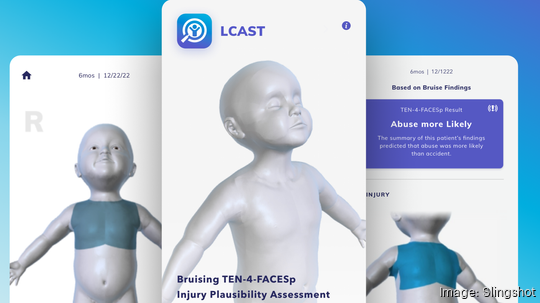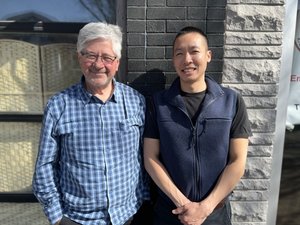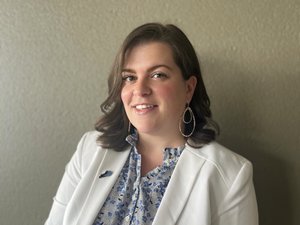
It’s a difficult topic. But now, an app will provide a new resource to identify earlier recognition of abuse in children younger than 4 — in part from a software and mobile app development company headquartered in the commonwealth.
Louisville-based Slingshot recently launched its latest app in conjunction with Ann & Robert H. Lurie Children’s Hospital of Chicago and the New York City-based biomedical company BioDigital.
The app’s name is the Lurie Children's Child Injury Plausibility Assessment Support Tool, or LCAST for short. Its impetus comes from the vision of Dr. Mary Clyde Pierce, an emergency medicine physician at the hospital and Kim Kaczor, a senior research scientist at Lurie Children’s.
LCAST officially launched on Tuesday, April 4, near the beginning of National Child Abuse Prevention Month. The app is free and available on both iOS and Android platforms. The app is being marketed to pediatricians, nurses, social workers and others who work with children — but anyone can download and use it.
The app uses the identifiable characteristic of bruising to serve as a screening tool, assist with evidence-based decision making, and hopefully decrease the number of incidences of severe injury and death in children younger than 4 years old — given how frequent physical abuse can be overlooked or misdiagnosed as being accidental before a more severe (or deadly) event takes place. The app is not to be used as a means, though, to actually diagnose abuse.
“Bruising on a young child is often dismissed as a minor injury, but depending on where the bruise appears, it can be an early sign of child abuse,” said Dr. Pierce in a release. “We need to look at bruising in terms of risk. Our new app, LCAST, helps clinicians identify high-risk cases that warrant evaluation for child abuse. This is critical, since abuse tends to escalate, and earlier recognition can save children’s lives.”
On the home front, Kentucky’s rate of child abuse victims continues to be one of the worst in the country. According to the “Children Maltreatment 2021” report by the U.S. Department of Human & Health Services Children’s Bureau, the commonwealth had the sixth highest child abuse rate of 14.7 victims per 1,000 children in 2021 — compared to the national average of 8.1 victims. For comparison, the rate in Indiana was 13.6 victims.
How the app works
Slingshot — who last made news by raising and donating money to its Ukrainian colleagues on the one-year anniversary of the Russo-Ukrainian War last month — built the app through the implementation of a 3D rotating model of a child that was created by BioDigital.
Users can click on the body parts where the child has bruises. In addition, users answer questions about other factors and symptoms and about the injury event itself.
After all of the information is submitted, a result will appear to inform the user of the likelihood that the bruises resulted from an accident or physical abuse. The result is calculated using an algorithm based on a variety of published research evidence.
To create the research evidence, Dr. Pierce, Kaczor and other team members screened more than 21,000 children younger than 4 years old for bruising. Out of that original number, they enrolled 2,161 for their study using a bruising clinical decision rule created by Dr. Pierce that identifies specific regions of the body.
Through the study, the researchers discovered that by using the decision rule that it had a sensitivity of 95% and a specificity of 87%. .
Slingshot, which built the software to collect data for the development of the decision rule, has been working with Dr. Pierce and Kazcor for more than a decade.
“It’s been incredibly gratifying to be the tech company behind such an impactful vision,” said David Galownia, founder and CEO of Slingshot, in a news release. “Dr. Mary Clyde Pierce and Kim Kazcor have been tireless in their dedication to the field and are leaders in driving tangible research that ultimately improves patient outcomes and saves lives. My favorite part of this app is the impact it can have. I love that this project was donor-funded and made possible entirely by people who want to make a difference.”
An anonymous donor provided the funding to build the app’s infrastructure for an undisclosed amount. The research data behind LCAST came from financial support from Eunice Kennedy Shriver National Institute of Child Health and Human Development and The Grainger Foundation.









